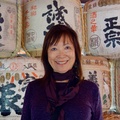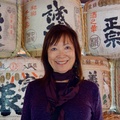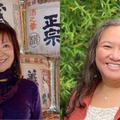Orchid Season in Mr. Ikeda’s Garden
:
The “Welcome” sign
still hangs above
his garden gate
though koi no longer swim
in the emptied pond
and hummingbirds
do not return at spring
some say the bees
are disappearing too
but Mr. Ikeda’s orchids
can still fill a greenhouse
:
White with its bold yellow throat
The palest pink with violet veins
Jungle green freckled with
ginger and maroon
What could be better than choosing
the most gorgeous
Or be lost in so much
luxurious profusion
:
In Japanese legend, life’s bounty
for a man with big ears
Surely, Mr. Ikeda has
the biggest ears seen
for miles around
:
When the garden was in full bloom
all six of his children
were by his side
When his eldest son died two winters ago
so many children and orchids
blossoming still
:
His daughter says Mr. Ikeda’s sons had the best deal
they went to the fancy houses
and gardened with him all morning
they ate special lunches
packed by their mother
were given a whole dollar
and even got to swim
in the rich people’s pools
while she and her two sisters
cleaned and cooked
and wished they were boys
:
He has trouble walking now
makes sure he’s given each type
of orchid to all five remaining children
No words for his gardening secrets
just hope—for keeping
everything he’s grown alive
—for Tadashi Ikeda, 1923-2009
A Question of Scriptures
—for sensei Peter
1. Sansei Bride
Once I was married to a Buddhist.
I was raised Protestant, but we didn’t
seem so different—our parents made us
go to Sunday School, where we sang
from hymnals bound in leather—
“Jesus Loves Me This I Know”
in tune with “Buddha Loves Me,”
both to organ accompaniment.
On a hot August afternoon
I walked down the temple aisle
not knowing anything about his religion
other than the ornate gold altar,
an unfamiliarly sweet scent
of incense, and some vague Buddhist
notions about life being transitory
and human suffering, eternal.
Back in 1970 that message felt dismal
and besides, I’d replaced
church with radical politics,
me in my $75-sales-rack
wedding gown from Robinson’s,
my legs shaking so hard
I needed a tranquilizer
to get through the wedding march.
2. The Enemy
We argued about everything,
including the war—my husband’s unlucky
draft number, his unwillingness to protest
on moral or even Buddhist grounds,
his joining the Army reserves.
If it were today, he’d be in Iraq.
But in 1971 we were fighting Vietnam
and this was his way to stay home.
Meanwhile I became a student
of war—from Marx to Malcolm X,
instilled to worship
the idea that one side
is always absolutely right.
But just like in my old Sunday School,
I couldn’t ask questions,
held my poems in secret.
3. Unlikely Insurgents
I divorced my Buddhist husband
but didn’t expect
all the little bodhisattvas
who’d keep tapping me
on the shoulder,
tendering tea,
laughter, words
bursting all boundaries.
And I found myself
in a temple of poets—where
Buddha resides comfortably
with Rumi, Gandhi, Neruda,
and Guan Yin, goddess of mercy—
revolution possible
even in the simplest
act of writing.
Insomnia Entry No. 24
As I hear the LA Times guy roar down our street at 3:30 AM, braking every three to four houses, I think about Sesshu reading
poems on yesterday’s radio show, as he talks about a famous Zen
center up north with lovely hot springs where children aren’t allowed in the water and he wonders why such an enlightened
group would turn away the glorious sound of kids at play. Sesshu’s one of those guys who doesn’t go to church but can get real quiet inside until he brims over with some new burst and dazzle that needs to be written down while his three little girls are running, screaming, giggling through his house, Sesshu surrounded by the song of women’s voices, his girls’ and his wife’s, who don’t let him get away with too much macho and other -ismos or -isms. And it’s all good, that’s the thing, Sesshu’s yelling “motherfucker” and “hey, look at this” in one breath, the injustice and the gorgeous exploding in every direction he turns. And it’s all good, his poems so convincing, when you can laugh through all the shit, learn how to cook your own brand of menudo, keep the game ball rolling as long as you can.
*This article was first published in The Asian American Literary Review Spring 2012: Generations. The AALR has generously shared several of the forum responses, poetry, and prose with Discover Nikkei from this issue by David Mura, Richard Oyama, Velina Hasu Houston, Anna Kazumi Stahl, Amy Uyematsu, and Hiromi Itō (translated by Jeffrey Angles).
AALR is a not-for-profit literary arts organization. To learn more about it or purchase a subscription to the journal, visit online atwww.asianamericanliteraryreview.org, or find them on Facebook.
© 2012 Amy Uyematsu






